A few weeks into pre-k, Claire began to tell me about a new friend.
“Umma, JJ and I played hide-and-go-seek today!”
“Umma, JJ is so silly and funny.”
“Look, umma! JJ made me this drawing!”
I soon discovered that JJ was a kindergartener (so about a year older than Claire) whose Korean name initials are JJ. Whenever I arrived early for pickup to see Claire’s class returning from their afternoon walk, I’d see Claire and JJ walking together, often holding the same ring on the walking rope while giggling and chatting with each other.
I was glad to see that Claire had made a close friend. I knew she was friendly with the kids in her class, but this was the first time that she would voluntarily talk about a friend every day and say things like, “I miss JJ” on the weekends when she didn’t have school.
However, it bugged me a bit that JJ was Korean. Because Claire’s school isn’t too ethnically diverse, I was a teeny bit concerned by the fact that her first close friend was one of the few Asians among her peers. Is this a form of racism on my part? I dunno.
Nonetheless, I didn’t want my (possible) flaw to get in the way of a naturally blossoming friendship. The above was just a fleeting thought, anyway.
One day during pickup, I overheard JJ’s mother speaking to her in Korean. So I asked Claire if she and JJ speak to each other in English or Korean.
“한국말!” (“Korean!”) Claire replied.
When I asked her if the other kids in their class think this is strange, she told me that she and JJ think it’s fun to talk to each other in a language no one else understands. 🙂
A couple of weeks later, Claire began to talk about a new friend: David. It seemed that she, David, and JJ often play together.
I asked Claire’s teacher to point out David for me, and it turns out that David is half-Korean who knows Korean as well!
I am well aware that more often than not, we, as humans, naturally tend to gravitate toward those who are of similar ethnic backgrounds. After all, we usually have more in common with them, no? I also remember reading studies that find ethnic minorities to experience this kind of racial affinity more strongly.
As usual, I’m probably overthinking my daughter’s choice in friends. They could just think it’s fun to speak to each other in Korean, and that may be it! But it’ll be interesting to see how this develops as Claire — and Aerin! — get older.
Unfortunately, there is no one in Claire’s class who speaks Cantonese. Now that would be fun to observe!

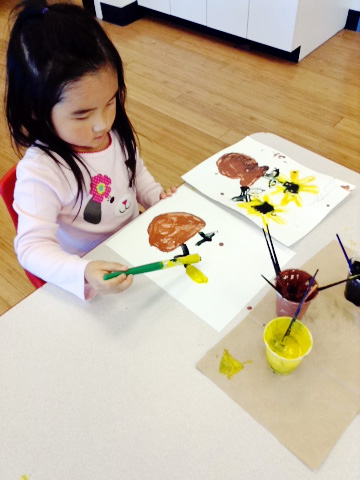

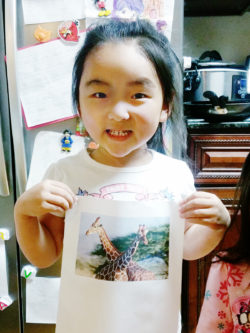
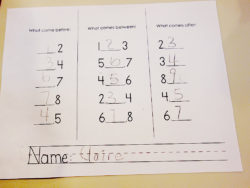
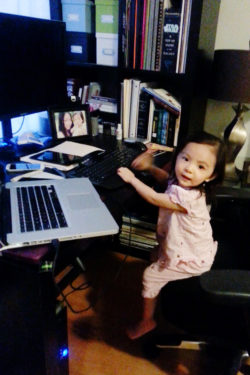

 I like books, gadgets, spicy food, and art. I dislike shopping, hot weather, and the laws of entropy. Although I am a self-proclaimed computer nerd, I still have a love for handbags and makeup... and I am always teetering on high heels. To learn more about me, visit the
I like books, gadgets, spicy food, and art. I dislike shopping, hot weather, and the laws of entropy. Although I am a self-proclaimed computer nerd, I still have a love for handbags and makeup... and I am always teetering on high heels. To learn more about me, visit the 
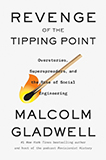

This used to bug my mom a lot when I was in elementary school, since the student population was predominantly Caucasian and yet all my friends were Asian. It was just easier to relate with people that had similar backgrounds – they understood that my parents weren’t evil just because they spanked me and they didn’t think my packed lunch of Chinese foods was weird and stinky.
In my freshman year in college, I took a personal writing seminar. The class was about 15 people, and one Asian girl shared a very personal story about how she had to hide her boyfriend from her parents because they didn’t approve and if they found out, they would be so angry and disappointed in her and she’d have to end the relationship. The funny thing is, all the Asian girls nodded sympathetically as she shared, while the Caucasian girls all said “No offense, but your parents are awful! Mine would never tell me who to date!”
But I wonder what mixed race kids do… I’m white and my husband is Asian (Taiwanese) and I wonder, when we have kids, how they will identify. I know the US is so one-drop that if you’re not 100% white, you’re the minority, but I wonder if it depends also on their home life and how they look. I can’t speak Mandarin, so we speak English at home, so my children couldn’t do what yours do (and I think it’s totally awesome they have someone to use their other languages with — I hate being monolingual)! I also wonder if it’s how people perceive them and, once they begin to understand that, if they explore their identity by preferring friends of one race or another. I have no idea. But it does make me wonder about the future! And it’s funny how because I am married to someone who is Asian, people sometimes wonder if I’m part Asian.
Most of my friends are Asian. Like Emily said, they’re able to relate better. Heck, I simply wouldn’t have been able to hang out with white kids half the time (and my parents weren’t near as strict as some of my Indian friends’). I guess deep down I also feel slightly more comfortable, sometimes, around other Asians, though that feels weird to admit. Like, faced with a room of strangers I would probably naturally gravitate toward any Asians there. That said, I only speak English so I’m in a slightly different place on the spectrum.
It’s interesting that my experiences as an Asian are a bit different than those that others have posted. I moved to the US when I was 5 and started school where there was pretty much no Asians. There actually were and are a lot of Asians where I am from but they didn’t go to my school (based on neighborhoods). I guess therefore it was natural I had only white friends (the student population was really just white). Though I admit that whenever there was an Asian in my class we usually became friends (whether they were Korean or Pakastiani etc.) but not my best friends. I did have Indian friends through our circle of family friends outside of school, but I soon realized that I was completely outside of a certain Asian-American culture created in the other schools. It’s kind of ironic. Also just fyi, we didn’t speak English at home and I took Indian lunches to school very regularly and was very close to my family in India (we visited them regularly). So, even in college I have a mix of Asian and non-Asian friends but I am not really part of the larger Asian youth community…it’s kind of odd for me sometimes (in a good way).
At the same time, this is true for my younger brother as well. He has many more Asians in his classes but he also has a very mixed bag of friends. Some of my mom’s friends have even said that they wished their kids had some non-Asian friends as well…I don’t know why me and my brother were a bit different? Still I think whatever works is best! I think it’s kind of cool to be on both ends haha. Also sorry for this really confusing long essay.